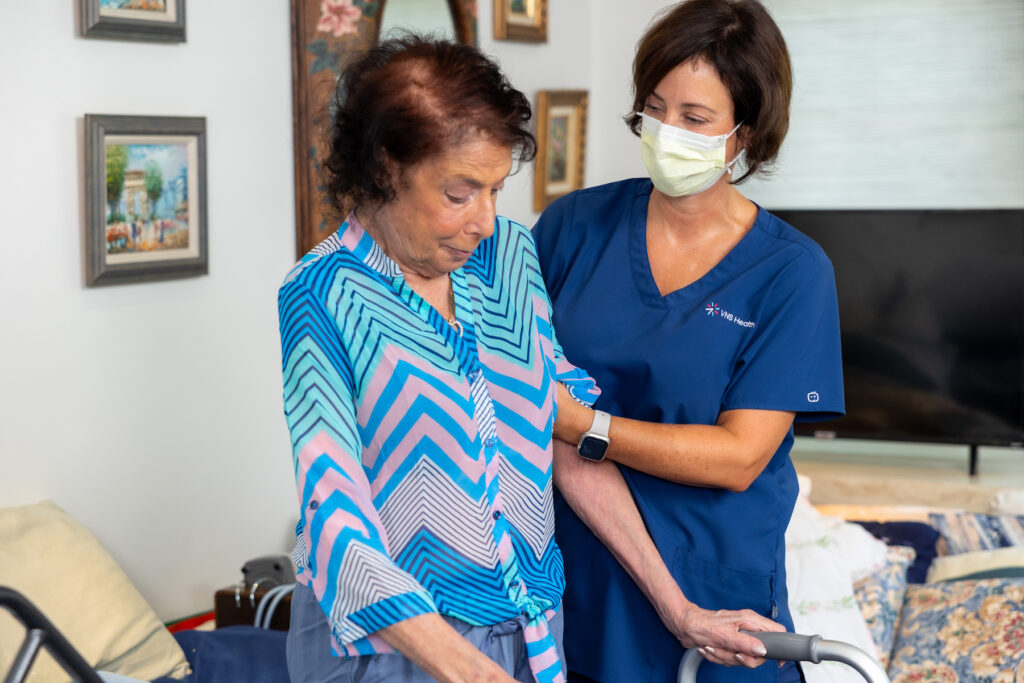
A key part of your loved one’s recovery from an injury, illness, or surgery is being able to do the things they could do before. Rehab therapy from VNS Health can help them regain the skills they need — all from the comfort of home.
Rehab therapy in the home offers a chance to focus on a single patient. You’re totally present with them and truly able to provide quality care.
Joe Gallagher, Director of Clinical Operations Support at VNS Health, former physical therapist and rehab instructor
Our rehab therapists use the latest knowledge and tools. So you can be sure that your loved one is getting the best care.
Your loved one’s rehab therapist will help set goals and work with their doctor and VNS Health nurse to create a unique plan of care. With rehab therapy, your loved one will regain the skills and confidence to they need to be independent.
What Kinds of Therapy Does VNS Health Offer?
VNS Health rehab therapists are committed to helping your loved one achieve their goals — whether that’s buttoning a shirt, walking around the block, or speaking clearly.
Physical Therapy
In-home physical therapy (PT) is great if your loved one is recovering from surgery, injury, or a hospital stay or has a chronic condition. Activities like walking up and down stairs, getting up from a chair or off the toilet, and reaching a high shelf can be hard. That’s where our PTs come in. They can help your loved one build strength, flexibility, balance, and coordination.
VNS Health PTs support your loved one by:
- Assessing home safety
- Ensuring that they are following instructions after a surgery
- Determining whether they would benefit from a cane or walker (and making sure they know how to use it safely and effectively)
- Suggesting ways to save energy and limit joint and muscle strain
- Making sure they can safely get in and out of bed and chairs
- Teaching them how to navigate stairs and curbs
- Creating exercise programs for building strength, improving balance and coordination, and increasing activity
- Screening for fall risks
- Educating you and any other caregivers
Are you worried about falling?
VNS Health offers a special Fall Prevention Program to help you regain balance and strength, so you can stay safe at home.
Occupational Therapy
Occupational therapy (OT) is great for patients after an injury or stroke and for people with conditions such as brain cancer, diabetes, or arthritis. OT helps people regain the fine motor control they need for activities like buttoning a shirt or using a spoon.
VNS Health OTs can help your loved one:
- Adapt their daily routine to meet their abilities
- Improve their fine motor, visual, cognitive, and perceptual skills to ease everyday tasks
- Learn how to use special equipment or strategies to complete basic tasks safely
- Recover quickly using exercises, wheelchair seating and positioning programs, and home modifications
- Educating you and any other caregivers on how to keep your loved one safe
Speech Therapy
Speech therapy is great for patients with conditions such as Parkinson’s disease, multiple sclerosis, ALS, Alzheimer’s disease, a head or brain injury, head or neck cancer, and stroke. Speech therapy can help patients of all ages — and not just with speaking. If your loved one has a condition that impacts the muscles that control swallowing, speech therapy can help.
Although the main goals are to help your loved one relearn how to speak and improve their ability to form words and sounds, speech therapy involves much more than that.
VNS Health speech therapists can help your loved one:
- Strengthen their mouth, neck, and face muscles so they can speak more clearly and avoid choking or coughing
- Follow a personalized swallowing program
- Find other ways to communicate after a stroke, including gestures and facial expressions
- Use strategies to reduce frustration when communicating becomes difficult
- Understand and process what other people say to them
- Read, write, do math, and remember things
- Adapt to daily activities
Related Services
Alzheimer's & Dementia Care
Expert care for those living with dementia or Alzheimer’s and support for their caregivers.
What to Do When Someone Falls — And How to Help Them Up
When a person falls, it's important to help them up safely.